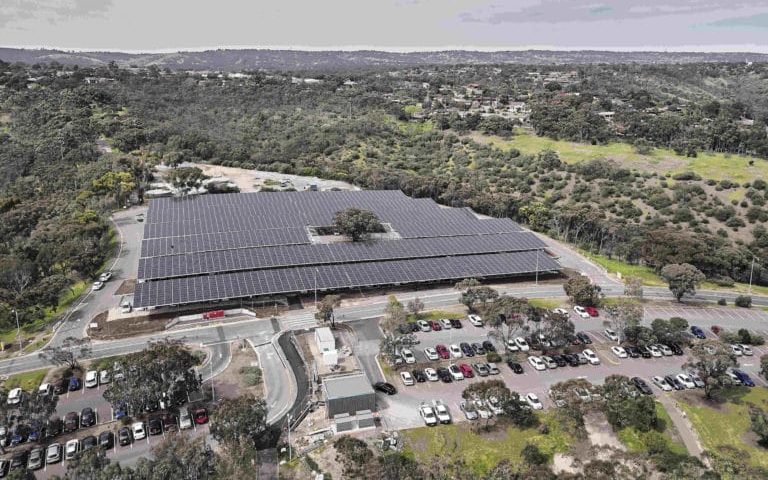Flinders University has signed a five-year deal with Engie’s retail arm, Simply Energy, to supply the all of its South Australian campuses with electricity from Willogoleche Wind Farm, a the 119 MW facility in South Australia’s mid-north.
The supply announcement complements the university’s established solar carpark and rooftop systems, which were already supplying 20% of the main campus’ electricity needs. The deal means Flinders has now achieved net-zero emissions from electricity.
“Our Bedford Park campus currently generates 2.22 MW of renewable energy from solar installations on building roof tops and car parks (including 4,136 panels over carpark 3), with more recent additions increasing that number to 7,467 panels, and we are continuously assessing future investments in renewable energy. We have also recently installed 13 new electric-vehicle charging stations and begun to transition our vehicle fleet to electric vehicles,” Vice-Chancellor Professor Colin Stirling said in a statement.
Not satisfied with net-zero emissions from electricity, the Vice-Chancellor says the university is gearing up to be one of the first carbon-positive tertiary institutions through a range of renewable supply and storage projects.
“We’ve set a clear target on becoming carbon positive and this announcement demonstrates our ongoing commitment to champion sustainability by working with industry to address real world challenges,” Stirling added.
“Climate change is an important area of research at Flinders University and we are showing that we can ‘walk the talk’ when it comes to meaningful change in our energy operations.”
Last year, the University of Sydney made a raft of commitments across a range of sustainability fronts, most notably a commitment to source 100% of its electricity from renewable sources by 2025 and reach net zero emissions by 2030. Yet despite announcing in 2015 that it would divest from fossil fuels after a referendum found overwhelming support, a freedom of information inquest reveal it was still holding $22.4 million worth of coal, oil and gas investments in 2019.
Victoria’s La Trobe University is well on its way to achieving its ‘net zero’ carbon emissions by 2029 goal, while the University of Melbourne and Monash have both set goals to become carbon neutral before 2030.
This content is protected by copyright and may not be reused. If you want to cooperate with us and would like to reuse some of our content, please contact: editors@pv-magazine.com.









By submitting this form you agree to pv magazine using your data for the purposes of publishing your comment.
Your personal data will only be disclosed or otherwise transmitted to third parties for the purposes of spam filtering or if this is necessary for technical maintenance of the website. Any other transfer to third parties will not take place unless this is justified on the basis of applicable data protection regulations or if pv magazine is legally obliged to do so.
You may revoke this consent at any time with effect for the future, in which case your personal data will be deleted immediately. Otherwise, your data will be deleted if pv magazine has processed your request or the purpose of data storage is fulfilled.
Further information on data privacy can be found in our Data Protection Policy.